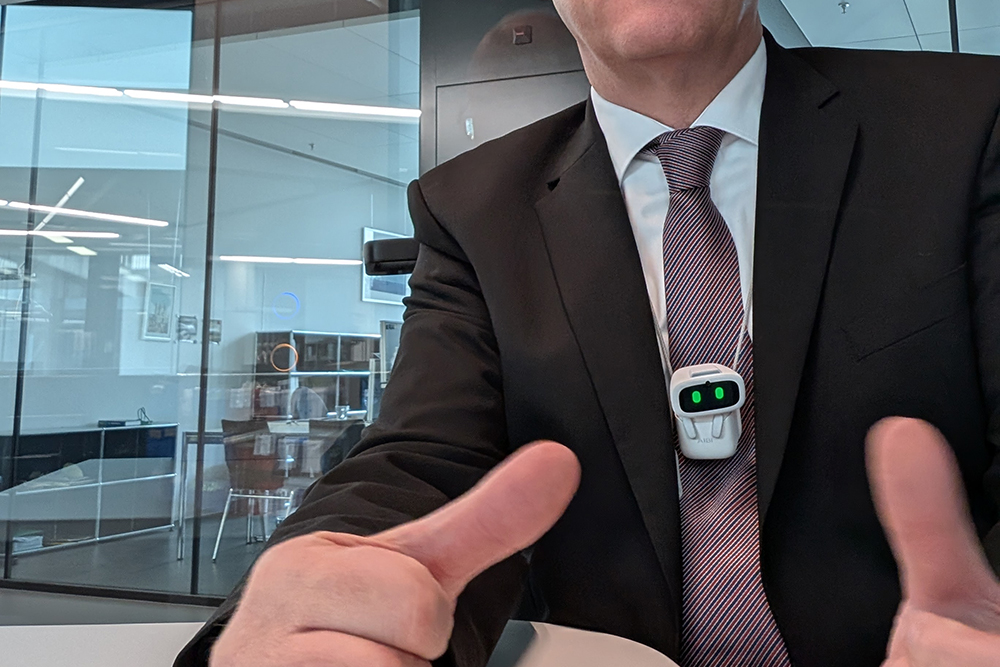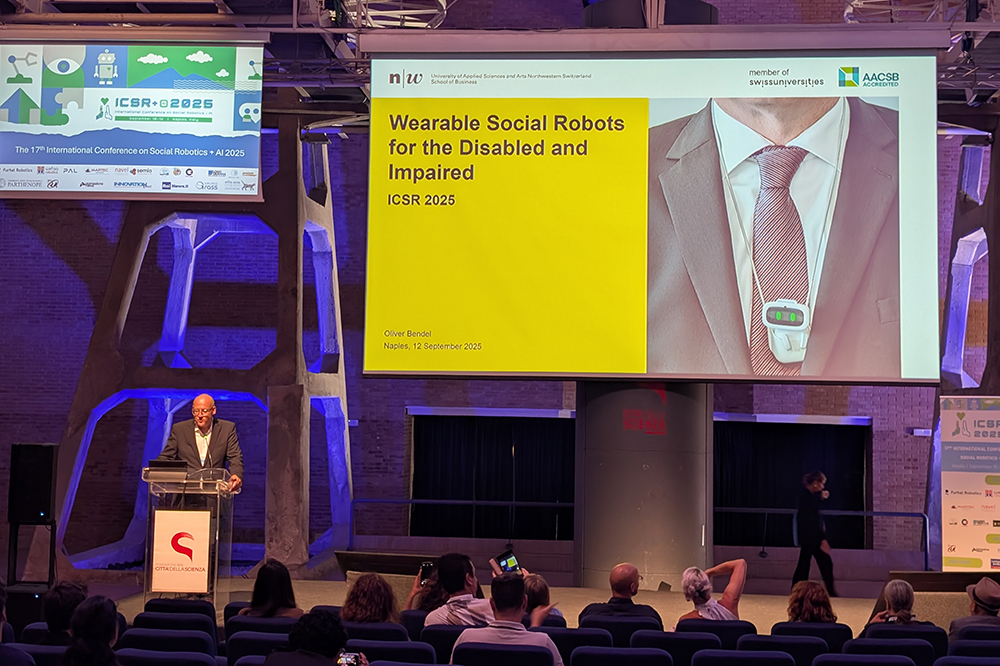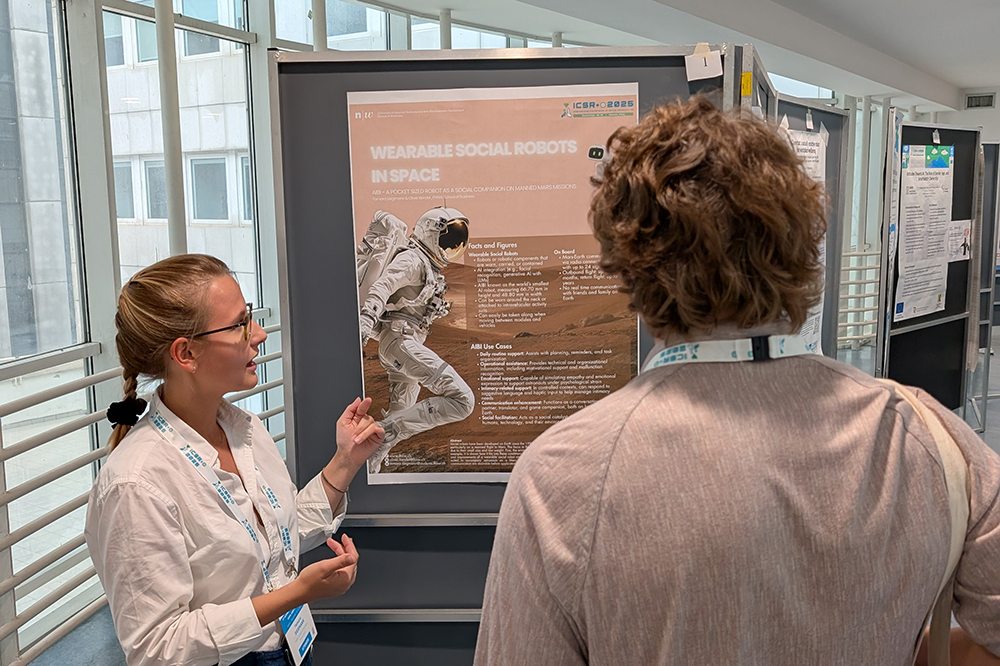The article “Wearable Social Robots in Space” by Tamara Siegmann and Oliver Bendel was published on December 23, 2025. It is part of the volume “Social Robotics + AI: 17th International Conference, ICSR+AI 2025, Naples, Italy, September 10–12, 2025, Proceedings, Part I.” From the abstract: “Social robots have been developed on Earth since the 1990s. This article shows that they can also provide added value in space – particularly on a manned flight to Mars. The focus in this paper is on wearable social robots, which seem to be an obvious type due to their small size and low weight. First, the environment and situation of the astronauts are described. Then, using AIBI as an example, it is shown how it fits into these conditions and requirements and what tasks it can perform. Possible further developments and improvements of a wearable social robot are also mentioned in this context. It becomes clear that a model like AIBI is well suited to accompany astronauts on a Mars flight. However, further developments and improvements in interaction and communication are desirable before application.” The Swiss student presented the paper together with her professor on September 10, 2025, in Naples. It can be downloaded from link.springer.com/chapter/10.1007/978-981-95-2379-5_33.
Towards Inclusive AI and Inclusive Robotics
The article “Wearable Social Robots for the Disabled and Impaired” by Oliver Bendel was published on December 23, 2025. It is part of the volume “Social Robotics + AI: 17th International Conference, ICSR+AI 2025, Naples, Italy, September 10–12, 2025, Proceedings, Part III.” From the abstract: “Wearable social robots can be found on a chain around the neck, on clothing, or in a shirt or jacket pocket. Due to their constant availability and responsiveness, they can support the disabled and impaired in a variety of ways and improve their lives. This article first identifies and summarizes robotic and artificial intelligence functions of wearable social robots. It then derives and categorizes areas of application. Following this, the opportunities and risks, such as those relating to privacy and intimacy, are highlighted. Overall, it emerges that wearable social robots can be useful for this group, for example, by providing care and information anywhere and at any time. However, significant improvements are still needed to overcome existing shortcomings.” The technology philosopher presented the paper on September 12, 2025, in Naples. It can be downloaded from link.springer.com/chapter/10.1007/978-981-95-2398-6_8.
Initial Thoughts on Wearable Social Robots
Wearable social robots are very small yet extremely powerful systems that can be worn around the neck, on the body, or in a shoulder bag or handbag. They are not only companions to humans, but become part of them by expanding their senses and means of expression. The article entitled “This robot suits you well!” (subtitle: “On the phenomenon of wearable social robots”) by Oliver Bendel defines the term “wearable social robots”, presents areas of application, and discusses social and ethical challenges. Recommendations for developers and users are also provided. It becomes clear that wearable social robots represent novel tools and extensions or enhancements of humans, whose capabilities go beyond those of apps on smartphones. The article was published on September 25, 2025, in Wiley Industry News, not only in German but also in English. It can be accessed at www.wileyindustrynews.com/de/fachbeitraege/dieser-roboter-steht-ihnen-aber-gut or www.wileyindustrynews.com/en/contributions/that-robot-suits-you-well.
Oliver Bendel on Wearable Social Robots
At the last session of the ICSR on September 12, 2025, Oliver Bendel presented his full paper titled “Wearable Social Robots for the Disabled and Impaired”. He began by defining the term wearable social robots, which he sees as a special form and combination of wearable robots and social robots. One example is AIBI, a small robot that he briefly wore around his neck during the talk. Wearable social robots can include functions for games and entertainment, information and learning, navigation and description, and combating loneliness and anxiety. Potential user groups include pupils and students, prison inmates, astronauts, and disabled and impaired persons. Franziska and Julia demonstrated in videos how they use AIBI as a companion and for social support. With this paper, Oliver Bendel continued his work in the field of inclusive AI and inclusive Robotics. The ICSR is one of the leading conferences for social robotics worldwide, and its 17th edition took place from September 10 to 12, 2025, in Naples, Italy. Mariacarla Staffa (University of Naples Parthenope, Italy), John-John Cabibihan (Qatar University, Qatar), and Bruno Siciliano (University of Naples Federico II) served as the main organizers. Over the course of the three days, 300 participants attended, contributing once again to the advancement of social robotics.
About Robots in Space
On September 10, 2025, Tamara Siegmann and Oliver Bendel presented their short paper “Wearable Social Robots in Space” at the ICSR poster session. The ICSR is one of the leading conferences for social robotics worldwide. The 17th edition takes place from 10 to 12 September 2025 in Naples, Italy. The term “wearable social robots” was introduced by Oliver Bendel in his article “Wearable Robots” and in his full paper “Wearable Social Robots for the Disabled and Impaired” (both from 2025). These are social robots with features of wearables and wearable robots. One example is AIBI from LivingAI. Tamara Siegmann and Oliver Bendel, both from the FHNW School of Business, investigated possibilities for the use of wearable social robots in a Mars mission. They demonstrated that these are useful for daily routine support, operational assistance, intimacy-related support, communication enhancement, and social facilitation. This is the first study of its kind. However, reference could be made to several projects involving humanoid and social robots for space missions. The poster can be downloaded here.
Wearable Social Robots for Space Missions
The short paper “Wearable Social Robots in Space” by Tamara Siegmann and Oliver Bendel (FHNW School of Business) has been accepted for presentation at the International Conference on Social Robotics (ICSR). The conference will take place from September 10 to 12, 2025, in Naples, Italy. Social robots have been explored on Earth since the 1990s, but this study considers their application beyond our planet – specifically, on manned missions to Mars. The focus lies on wearable social robots, a promising form factor due to their compact size and light weight. Using AIBI as a case study, the short paper examines how such a robot could support astronauts under the unique psychological and environmental conditions of deep space travel. The authors discuss the little robot’s potential roles and highlight directions for future development, particularly in improving human-robot interaction and communication. The findings suggest that wearable social robots like AIBI could offer valuable support on long-duration space missions.
About Wearable Social Robots
The market for wearable social robots remains relatively small. As illustrated by the case of AIBI, early models often face typical teething problems, with user forums filled with questions and complaints. Nevertheless, these technologies hold potential for a wide range of future applications, offering support and benefits not only to healthy individuals but also to people with disabilities or impairments. The paper “Wearable Social Robots for the Disabled and Impaired” by Oliver Bendel explores this topic in depth. It defines wearable social robots and situates them within the broader category of wearable robotics. The paper presents several examples and outlines potential application areas specifically for individuals with disabilities. It also addresses key social, ethical, economic, and technical challenges, building on the preceding analysis. The paper has been accepted for presentation at ICSR 2025, which will take place in Naples from September 10 to 12.






